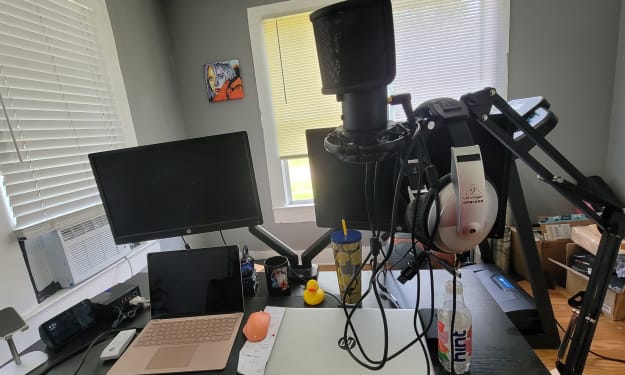Interview with a Refugee
Ration Challenge USA 2021

If you haven't heard of the Ration Challenge, please give me a moment of your time. This worldwide charity event challenges participants like me to eat the rations of a Syrian refugee for a week. Participants are sponsored, and donations can earn us rewards like spices, milk, or more rice.
Proceeds go to refugee families. We are so close to my goal and I know we can not only meet it, but exceed it before the May 27 cutoff. My link is https://www.rationchallengeusa.org/brittany-nunez
The Reason
The first thing that came to mind when I heard about the Ration Challenge was my friend, Ivana P. I know she's a refugee. I know she has gone through hell and back. What I didn't know was how to get her story out, so I decided to interview her. She happily accepted and now I'd like to share her story with you in hopes that you can find inspiration in her strength to sponsor me so we can help families like Ivana's.
Can you tell us a little about where you came from?
a. My family was originally displaced from my home country of Former Yugoslavia during the Civil Balkan War, in April of 1992. The war reached my hometown of Sarajevo some time in March of that year, and my father was not a militant man, and thus chose to relocate his family out of what was to become one of the largest sites of the war before things escalated to a point of no return. We originally moved a few hundred miles to a small village where my aunt had a weekend vacation home, and by July of the same year, had relocated to Germany, where we remained from 1992-1998.
Why and when did your family decide to leave?
a. The Balkan war originated in the western most state of former Yugoslavia, Slovenia. Military troops moved into this area to prevent the state from seceding from the rest of the country, and the war spilled over from there across the remained of the nation. Sarajevo, my hometown, would become the epicenter of the war during the next 3 years (1992-1995). All able-bodied adult men were being called to war, and my father was strongly against the war and decided, along with my mother, to relocate us as far away from this area as possible. The war reached Sarajevo in March of 1992, and by April, it was fully raging. On April 17, 1992, my sister, my parents, and I caught the last train to leave Sarajevo before its complete siege and headed for Doboj, another city in the state of Bosnia. We stayed in a small village outside the city for several months with my aunt, uncle, and two cousins, in hopes of the turmoil blowing over and being able to return home. This was evident by only the two bags of clothes we had packed for all 4 of us, as no one thought this would be a permanent move. After being discovered in hiding, my father was forcibly taken to the war front for a period of time, and upon his return, the immediate plan was to leave and head to Germany.
Was it difficult maintaining financial support when your family immigrated?
a. Finding work as an immigrant was immensely hard, especially work that would suit one’s skills. My mother was an accountant in our home country, and my father in charge of security for a large international company. While we did become documented immigrants, with a temporary asylum (literally translated from German, it was called TOLERATION), my parents worked odd jobs to make ends meet. My father found a job at a curtain factory which was a true blessing for our family, while my mother become a housekeeper and janitor at odd jobs to make ends meet. My parents never allowed my sister or me to feel the hardship of our finances; we were very lucky to always have food, a roof over our heads, clothes on our backs, and as much adventure as was possible with the budgets we had.
Did you receive any negativity for coming to the United States? How did that feel and how did you overcome it?
a. Moving to Germany, there was a lot of stigma around refugees from war zones, and we were very negatively looked upon for a long time. We did not experience the same type of discrimination in the United States; however, underlying dislike for foreigners was still unavoidable. Strangely enough, many Yugoslavian refugees were considered mild mannered, hard working, honest people (I say strangely as this was as much of a stereotype of an entire peoples as the assumption that all immigrants are government mooches), which helped to control the negative narrative around Balkan refugees. Many of the adults worked several jobs to achieve the American dream – owning a home, a car, paying for their children’s education, material possessions, etc. Fear of the unknown from American families is what made integration hard for us, but working hard to speak English perfectly, to earn good grades, to keep your head low and stay out of trouble is what helped us reach a point where most people could not tell that my sister and I were foreign.
b. Upon our arrival on the US, my family did not speak English at all. While my father was a very educated man (master’s in sociology and political science), one of his very first jobs included scrubbing toilets at a granite factory, and later on being a “facilities manager” for a local university. He did this work for lack of English and for hopes of staying there to ensure my sister and I would receive a free college education. The job was however too physically demanding in the long term and he was able to find better and better paying work, even if it meant we all had to take out some loans to ensure we could afford college.
Do you or your family still struggle as refugees in any ways today? If so, what could be done to better help you?
a. In personal relationships, I still find hardship from being a refugee. New England is a fairly open-minded part of the country, but I find myself often reminded of the fact that I am an immigrant and a refugee. Disdain for immigrants, illegal or otherwise, is very much engrained in American culture, especially older generations. I have on more than occasion been told that “we like YOU and your family – you came here the right way!” which is an incredibly hurtful thing to hear. As a 14 year old, and my sister as an 11 year old, we had no say over where our lives would lead and what country we would end up in after our deportation from Germany. Being sent back to a country that is at this point mostly as strange to us as any other foreign nation would have been detrimental to our development.
If you could give every refugee family one thing, what would it be?
a. I would offer them the same type of support we received as incoming immigrants: a loan towards plane tickets with a reasonable repaying option; initial housing, language support, help finding a job and integration into the new culture. I am extremely grateful to the USCRI for the late nights my parents spent at our dining table learning English with an ESL volunteer; for the section 8 housing they helped us get; for the food assistance we received for less than 30 days upon arrival here as my parents wanted to teach us never to depend on the government unless absolutely necessary, and simply for the opportunity to immigrate to the US and pursue a life that may have been challenging at best, or impossible at worst, had we been deported back to a war-savaged nation.
Thank you, Ivana!
The Ration Pack

My food for the entire week of June 13-19, 2021 will consist of the following:
- Water
- Rice: 15 oz
- Lentils 6oz
- Dried chickpeas: 3oz
- Canned sardines: 3.75oz
- Canned kidney beans: 15.5oz
- Vegetable oil: 12oz
The Concept
What's listed is all I will be eating for a week in June. It mirrors ration packs given to Syrian refugees. Sponsors can help me earn 'rewards' like spices, extra rice, and more. Your money goes to helping refugee families get access to resources they desperately need such as food, healthcare, and education. You have from now until May 27 to donate. Please click my link below for more information. You're all amazing and I love you so much! Thank you in advance for any assistance you may be able to provide to refugees.
https://www.rationchallengeusa.org/brittany-nunez
If there is one community that can make this happen for refugees, it's the Vocal community!






Comments
There are no comments for this story
Be the first to respond and start the conversation.